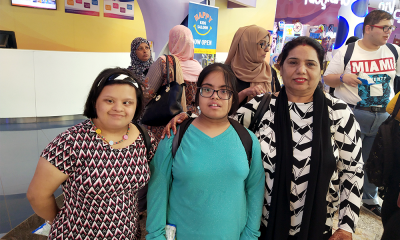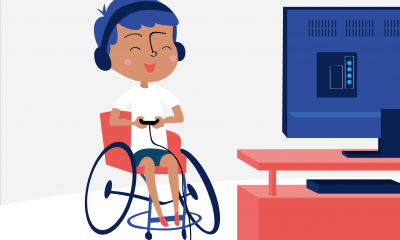Inclusion
How to Advocate for Children of Determination
I used to imagine a person who was confrontational, often raised their voice and refused to listen.
What do you think of when you hear the word “advocate?” I used to imagine a person who was confrontational, often raised their voice and refused to listen.
When my daughter was diagnosed with cerebral palsy just before her first birthday, people quickly began telling me one of two things: either that I would be a very strong advocate for my daughter, or that I would need to be a strong advocate for my daughter and fight for the services and supports she needed. It felt like a lot of pressure and it didn’t align with how I envisioned myself interacting with my daughter’s support team. I resisted the term for years, until I figured out how to define advocacy for myself.

Illustration by (c) Reset Fest Inc, Canada.
Often times, we wouldn’t get the support my daughter needed unless we simply asked and outlined our case. This was an easy way for me to start my journey as an advocate. It didn’t feel confrontational, like I’d imagined, because advocacy just meant asking for what we required and letting my daughter’s support team come up with a solution. Most recently, I found out my daughter’s scheduled bus pickup time would require her to be on the bus for over an hour, despite her school being only 20 minutes from our house. I simply outlined why this wouldn’t work for her due to a recent hip surgery she’d had, and her school team was able to work with the transportation department to adjust her pickup time.
The most basic definition of an advocate is someone who supports.
I also discovered that advocacy can help not just my own daughter, but other people and children of determination like her. By joining various volunteer committees and groups, you have a chance to share your knowledge and perspective as a parent of a child of determination. Opportunities vary depending on where you live, but simply asking at your child’s school or any therapy or support organizations your family works with can be a great place to start. If your school doesn’t have a support group for parents of children with special needs, you can work with the school to start one. Look at April McCabe, a Dubai-based autism advocate, who started a WhatsApp group that now has over 150 families in it.
Advocacy can also be about increasing awareness and social media now allows us all to do that fairly easily. When Syona was first diagnosed, we immediately shared it with our family and friends. It was important to us to be open about it and ensure there was no stigma associated with her diagnosis. I also decided to tell our story by writing about our journey as a family and regularly shared articles to raise awareness on Facebook and Twitter. All of these factors helped our friends, family and community get a better sense of our lives.

Illustration by (c) Reset Fest Inc, Canada.
The most basic definition of an advocate is someone who supports. Whether it is a cause, a person or a group of people. Though arguing is sometimes part of that role, my definition of advocacy is about collaborating and finding the best solution that works for everyone. When I reframed my definition of advocacy, I realized I was already the best advocate for Syona, simply by being the parent she needed. It was easy to be an advocate for her. However, I also realized that it is and continues to be my responsibility to be an advocate for others like her. Advocacy can be difficult for those who don’t have certain resources. I can be a strong advocate for my daughter, kids like her and the cause of inclusion because I have resources. I have a supportive husband who is involved in our family life, we have a good family income, I am educated and speak the language. All of these factors make being an advocate and standing up for my daughter’s rights easier.
My concern is for those who don’t have these resources and truly aren’t able to advocate. In the early days of our journey, a friend told me his goal is to leave things better for families that follow in his family’s footsteps, and I believe most of us can also find ways to do this.
What does being an advocate mean to you and how do you do it?
Anchel Krishna is a mom of two daughters, including one with cerebral palsy. She works as a communications professional for a children’s rehabilitation organization in Canada and does some freelance writing about being a parent. Follow Anchel on Twitter.

























Rita
May 2, 2019 at 11:27 am
I really understood the meaning of advocate. It was very inspiring